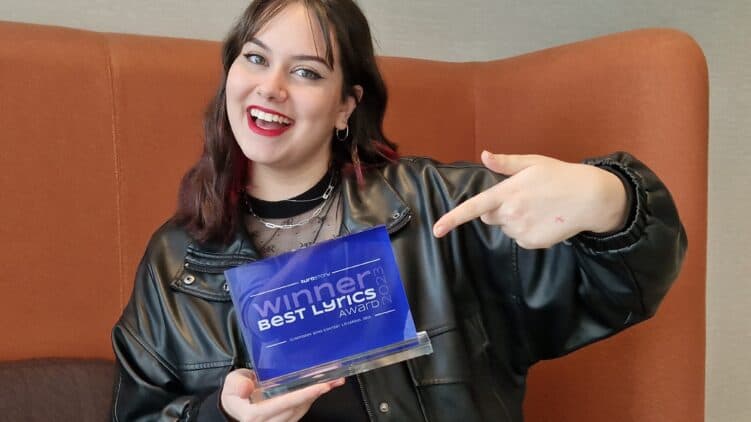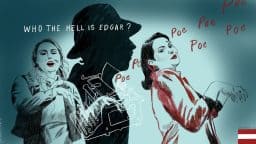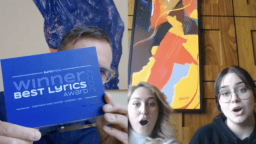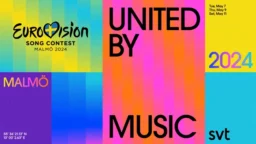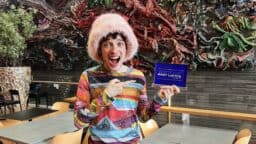Teya (Teodora Špirić, 23) sang Who the hell is Edgar? at the 2023-edition of Eurovision, for Austria, together with her friend Salena (Selina-Maria Edbauer, 25). To this song Teya wrote the funniest Eurovision lyrics in years, for which she was awarded with the Eurostory Best Eurovision Lyrics Award 2023. We went to Berlin to present the actual award to her, and had a long talk about what comes after Eurovision, and about ‘the Edgar liberation’.
Dear Teya, congratulations again on the award for writing the lyrics to a song that actually started with a conversation about writing lyrics…
Thank you. Yes, the whole Edgar Allan Poe thing just kind of happened. Because I was at a writing camp, talking to Elsie Bay, the singer songwriter from Norway, about how it feels like to write a good song, and then as a joke I said: ‘Let’s just write about how a ghost enters your body and writes the song for you.’ So we started writing this, and Edgar Allan Poe just kind of popped out. But it turns out that he has such a big fan base! And I loved Edgar’s work, when I had to analyse it at university, but it’s not like I’m the biggest Edgar Allan Poe fan. It was only later that I became such a huge fan of everything around this whole Edgar Allan Poe lore. Because so many people told me he was their favourite writer, and then I got messages from my university professors, saying: ‘We can use your song in our lectures.’
Do you think you chose it because of the sound of the name?
That could have been the case, of course. When Ronny, the producer, took the guitar and played some chords, I improvised the whole first verse. And how do you start a song about a ghost entering your body? You bluntly have to explain that thought in the beginning. So I was like: ‘There’s a ghost in my body, and he is a lyricist. It is Edgar Allan Poe…’ That fitted to the melody.
You needed a name that had that rhythm.
Exactly. But I’m sure there are other writers that have the same rhythm in their name.
You were illustrating what you were singing about, right? That you are somehow inspired, and some words come out, maybe triggered by the rhyme or the rhythm. And of course they come from some reservoir in your head, although you probably didn’t make the conscious choice there.
No, no, definitely not. Did you read Rick Rubin’s book The creative act, about creativity? He has such an interesting way of thinking about writing songs. He said that a writer, an artist, is the vessel of an idea, you’re not the creator of it. The ideas are just floating around in the universe, and whenever they’re ready to be written, they’re really close to you, and it’s upon you to be the vessel for it, to do something with it. And if it’s not you doing it, then somebody else will. And I think, probably there was something about Edgar Allan Poe in that time period. There was a movie coming out with Christian Bale, The Pale Blue Eye, a month after we wrote, or Wednesday, the Netflix show, where Edgar Allan Poe was a character. Salena called me when all of that was happening, and she was like: do you have a contact at Netflix? But of course we wouldn’t have noticed if we didn’t have that song. Suddenly we were seeing Edgar Allan Poe everywhere around. All in all I feel that I was lucky to be carefree enough in that moment, to just write and have fun.
And that you felt that this was the right song to finish.
Pele [Loriano, ES], my manager, and I, we are very big on trusting our gut feeling. I’ve worked with him for five years now, and we’ve always had the same intuition about everything. With Edgar, from the get-go we knew: this is the song. I had the first lines, and then I wrote the bridge to it and of course I researched about Edgar. I found out that he was the first American writer to live off of writing alone, so, you know, he was the perfect carriage for the message I wanted to convey about the low revenues on for example Spotify. We finished the song, and this might sound cocky, but something in us told us: this is it. We were in the top fifteen of possible Eurovision songs in Austria, performing for the jury, and we had already T-shirts made with Edgar Allan Poe on them. So we basically made the merch, before we even got picked. That’s how sure we were.
Or you could call that ‘manifesting’.
Well, also that. But I don’t know… Doing the music video the director asked me what I wanted to write on the prison tag, and I said: ‘Just write “Liverpool” and the date of the finale.’ It’s so funny, because neither Salena nor I ever planned to go as a duo or with a fun song. In the past we always wrote ballads. We never would have thought that we’d be on stage singing ‘Poe, Poe, Poe.’ But along the way we had so many signs that this was the right path. So there was truly never a single doubt in my mind that we shouldn’t go with that song. Cause we also had solo songs in. And in the next stage of choosing the Austrian song the top three was just Salena and I. It was both of us, then her solo song and my solo song. It might as well could have been one of us going solo. But I think both of us really wanted to do it together.
In your other lyrics, there’s always a strong message – although you’re not a preacher – of equality or diversity or the role of women in music and in society in general. Now this might be a stupid question, but do you regret in any way that that was not the biggest message for this song?
No. I don’t think it would have been right. Of course the message is in there, and I talked a lot about it in interviews. It’s definitely something important to me, but this message had to be this message. I did not sit down thinking, oh, I want everyone to know what it is like to be a female songwriter in the business. It’s more about songwriting and not getting the credit that you deserve and not being paid enough. And I’m glad that it has been this message. Even though I had doubts whether people would understand it. You know, before Eurovision, I was always writing for other artists. But whenever I wrote for myself, I usually didn’t write about my own emotions. Mostly because I have a rather boring life. I’ve never been in love or anything, so I can’t really write a lot of love songs or breakup songs because I just haven’t experienced that. I’m not a big party goer either, so I can’t really write about drugs or stuff. So I think with Edgar, the song really was a showcase for me. Can I just write down what I’m thinking about? Like, what I really feel? Even if other people have not been through that? And I think, because it was such a passionate topic for us, people started to care. And I think that’s what I want to do as a writer. I want to write stuff that moves me.
Without the fear of not being understood.
When it comes to the genre of the song and it being funny – you know, I don’t think a lot of people that listen to traditional pop will say: this is great music. I don’t think people that like classical music are ever gonna listen to Who the Hell is Edgar, and think: this is quality stuff. But for me it is. I feel that in ten or twenty from now, I’m gonna look back on this song and think: this topic was truly important to me and I’m glad that I went through with it. We told our truth and people then really started to talk about it, which was genuinely the most humbling thing. I am so, so grateful to have experienced this. Because I don’t think a lot of writers in the past have experienced this insane love for the lyrics.
When you submit a song for Eurovision you can be sure that, if it’s chosen, that’s gonna be a song that you’ll have to sing your whole life. So for the lyrics I can see that the message is something you’ll continuously be happy with over the years, but what about the music? Aren’t you afraid that at some point it will wear off?
I think so. I wouldn’t classify it as a timeless song. But not a lot of songs are timeless. Maybe Adele’s songs are, or Amy Winehouse’s, or the Beatles’. It was very current in this moment, it was how we felt it had to be, and it was the first time I did such a genre. I wouldn’t even know how to classify the genre, to be fair. I’ve written our second song, Bye Bye Bye, and our third, Ho Ho Ho, and the EP that I’m writing right now is also kind of in the same world, so it’s definitely something that’s very me. And as long as I’m doing what feels right, it doesn’t matter if in twenty years somebody’s still gonna listen to it. I truly don’t think so, because music is moving so fast. That’s just the way music goes, and I’m completely fine with that. At some point, I think I’m gonna step into a more timeless thing, because I’m also big on ballads. But I think there’s always gonna be whatever is fun to me, whatever I think is cool, whatever gets me bopping along, and also stuff that is timeless. I think I might have the possibility to do both. Yesterday, Pele and I were talking about the EP, and he asked: how about a ballad? But would it make sense to have four crazy songs and then one ballad? Maybe we’re gonna try to find a way to make a ballad but still have that Edgar vibe to it.
Have you recorded a slow version of Edgar?
We did an acoustic set where we played a slower, reggae-like version of it. And I think that was really cool, but it did kind of lose the flair. So I don’t think it would have made sense for us to record it. But you know, I think because of Edgar and the Eurovision thing, I just don’t have that old habit anymore, where I feared what people would think. I’m so grateful for that.
This sounds as if the whole Eurovision experience liberated your writing.
Yeah, absolutely. But not just my writing. It had a really big impact on my personal confidence. Especially growing up as an immigrant in a country where you don’t know the language or culture [Teya is of Serbian descent, ES] I’ve always been used to making myself smaller and as agreeable as possible, in order for people to like me. To be sure I’m not a sore sight. Because I was different already, you know? I had a bit of an accent, or I didn’t know the details of the language or I’m a woman in a field that’s more male-dominated, whatever. These things were engraved into my being, even two or three years ago, when I did an Austrian talent show [Starmania, where Teya and Salena met in 2021, ES], I was turning myself into someone that I think people would like. It was still me, of course, but I didn’t show the whole loud, outspoken version of me. And I think Eurovision and having so many loving fans really allowed us to be who we are. I’m just so grateful for that, because now I can be honest about what I like, about what’s uncomfortable to me. Saying no, taking up space, that’s something Eurovision taught me.
You’re giving Eurovision the credits for that, but you made the conscious decision to do this song and not a song where you adapted to the general idea of music. So in the end it’s thanks to you.
That’s very sweet. You know, I don’t think we have this gut feeling for no reason. Maybe it’s been something that I’ve always known. Like when I stopped playing tennis, because it didn’t feel right anymore. And when I stopped doing musicals, without knowing what to do next. After we had recorded Edgar and submitted it, Salena had had a lot of fun, but at some point she got some doubts. And of course, when it was out of our hands, you start thinking: are we going to make a fool of ourselves? Aren’t they going to think: who are these clowns, wearing moustaches, singing ‘Poe, Poe, Poe’? All those doubts came up at some point or another. But very briefly, because I was holding on to that gut feeling. Also, it might have been me being the songwriter of us both, but the song never would have been the same if Salena hadn’t been there. She had such a nice vibe that day. I never could have done it without her or Ronny who picked up a guitar.
But still, there was a point where you were concentrated enough to finish it.
Yeah, yeah, of course. I’m not trying to diminish my part in this whole thing. A year ago I was just not at this point. I had doubts whether music was the right choice for me. I had been working so much. I think my last vacation was in 2017. I went to so many songwriting camps and literally nothing happened. Yes, I got better as a writer, but I was so, so down. Pele and I had this whole conversation, after a songwriting camp in Switzerland where no good songs came from, and I was like: dude, I don’t know if I can do this anymore. And then he said to me: ‘There’s absolutely no reason it’s not going to work out for you, it’s just a matter of when, not if.’ And two weeks after that, we wrote Edgar. So yes, the whole thing is the fruit of the labour that I did all these years, the fruit of surviving on so little money, of my parents supporting me for years. I know it’s a bit hilarious that I know I’m talking of a song about Edgar Allan Poe being this divine, but it does feel like that to me.
Is it difficult to make conscious musical career decisions, having done something as big as Eurovision?
That’s a good question. With this whole ‘Edgar liberation’, let’s call it that – ooh, this is the title to your article!… You know, Pele and I are planning people. We think about what makes sense, about switching genres, those kind of things, and I told him: ‘I truly don’t know how to recreate this. I don’t know if I’m going to be able to write a song that’s in the same world or that has the same Edgar vibe. Because, when we wrote it, it just happened.’ And he said: ‘Well, then we’ll just wait for another moment where it just happens.’ So our second song, Bye Bye Bye, was again something that we just wrote out of fun. We didn’t think about it that much, and Pele came into the room and was like: yeah, that’s the song for you and Salena. And concerning Ho Ho Ho… – and I think this is a bit of a full circle moment, because it’s the last song we’re going to do together – well, Warner, the label, wanted to do Christmas songs. And I couldn’t imagine a way to write a Christmas song that is not kitschy. I said: ‘It doesn’t make sense for Salena and I to do a Christmas song, except, maybe, if, I don’t know, we write a song about Mrs. Claus and how she’s doing all the work.’ Pele said: ‘There’s the idea.’ And I thought: fuck, now we have to make it. But I love it so much, we had so much fun writing it, also because we could swear in it! We didn’t have to think about the Eurovision rules. So yeah, to go back to your question, I’m very scared when it comes to issues like: will I be able to recreate things I did before, or what genre should I try, but when you sit down and actually start writing, it just comes and flows, when you do it with the right people.
That’s not the only decision you have to consider. It’s also: are we going to continue as a duo, do I want to go into as many writing camps as I did before, do I want to be more of a songwriter or more of an artist?
I’m not going to lie: especially this whole thing of artist-songwriter was quite hard for me to step away from because I was so comfortable with just being a songwriter for many years. That is like a safe space. Being an artist, putting my stories out there and being in the spotlights is very much out of my comfort zone. I’m not really the extrovert that you would consider most artists to be. I think it was also pretty hard for the people around me, the people I work with, to change their mindset to: she’s also an artist now, and she’s doing her own thing as well. It involves a lot of saying no to people, because I don’t have the time anymore. Sometimes I was a bit scared that people thought: she was at Eurovision so she doesn’t have time for me anymore. It’s funny because, when I started, I had this identity crisis about being a songwriter. My very first writing camp, two years ago, truly, truly changed my life, because I went there being so insecure about calling myself a songwriter. I was like: I’m Teya, I study English and German in Vienna at the university. And then, I remember I was in a car, on the way back from the camp, and one of the other songwriters talked about how he travels around, how he’s in Berlin for a couple months and then in London. It was all so fascinating to me, and then something in me clicked. I thought: I have to start calling myself a songwriter or I’m never going to be one. And then, so ridiculous, I downloaded a diary app on my phone, in that car, while he was talking, and I wrote down how this camp changed my life, and that I was going to call myself a songwriter from then on. After that I slowly crept my way into the songwriting world, and then, two years later, I only called myself a songwriter and completely forgot that I initially started out as a singer. So this summer I really had to sit down, after Eurovision, and tell myself that I’m also an artist and I want to be an artist.
Did you put that in your diary app?
This time I wrote it down on paper. It’s funny how people that are not me have such a different perspective of me. They usually see me as the girl that went to Eurovision, the girl that is an artist, the girl that also writes songs, the girl that is going somewhere with her music, whatever, but for me it’s so hard to make that shift. I changed my Instagram bio from ‘singer/songwriter’ to ‘artist and songwriter’, and for me that felt so huge!
And the decision to continue as a duo or not?
I think Salena and I both are very comfortable in doing something together, because, if there’s going to be a backlash, it’s split up between the both of us. We don’t take it personally. We don’t feel nervous about releasing songs, because we do it together, so I think it’s very important for the both of us to step out of our comfort zone. We’ve always wanted to be solo artists anyway, so let’s just rip the band-aid off – Ho Ho Ho is going to be our last song together, we’re finishing on a high note. We’ve had a great year together, but I think for the sake of our growth, we need to do our own things. Coming January, February, we’re going to start releasing our own stuff.
Did Eurovision give you a group of contacts that understand these considerations? I mean, you met fellow artists that also had that crazy attention of three minutes – and everything that comes with it.
I talked to a lot of artists who did your Eurovision in the past years and they all say that it’s either been fantastic or it has been difficult. In any case: it leaves such a big footprint on your personal history. For example, I talked to Mia Nicolai [Netherlands] and Remo Forrer [Switzerland], but mostly to Luke Black from Serbia. I spent a lot of time with Luke in London. To a certain extent we’ve all had the same crazy experience, so there’s a lot we can share, also stuff that has been bothering us, that has been difficult, but also at the same time, our experiences have been so different, individually, that sometimes you cannot really relate to others. Of course you can have empathy for their struggles, but even Salena’s and mine experiences are different. Eurovision is not all glitz and glamour and it has been truly one of the hardest periods for a multitude of reasons. I think for other people, like Mia, as well. Luke, for example, had to do a lot by himself when it came to staging and stuff, which is very stressful. We all come from different countries, with different delegations, different songs, different budgets. But what we all do share is the incredible feeling of being on that stage in front of 11,000 people who truly, truly love the song you’re singing and know every word by heart. I don’t think I will ever experience that again, and that’s okay, because it’s supposed to be a once in a lifetime thing. And it’s very cool that I have friends that have gone through the same thing.
That used the same strong drug.
Exactly. I’ve never used drugs, but it probably comes close. I think a lot of us had the Eurovision depression. And you know, I get that. It’s a difficult thing going back home and not having that attention on you anymore. But personally, I knew it would be like that before going. I’ve experienced this ‘separation sadness’ multiple times. It’s a bit like having the best songwriting camp of your life for three days and then you have to go home. I’ve had that after songwriting camps, after tennis camps, after the last show of a musical, after being with friends in Serbia for the summer. It was always very, very hard for me to deal with separation, with this longing to go back to something. But at some point, when that happened for like the millionth time, I realized: this is life. When something wonderful comes, we have to appreciate it in the moment that it’s there, and when it goes we have to be grateful. Eurovision is a hundred times more emotional than the feelings you have after a three days songwriting camp, because it’s been six months of preparation and then two weeks in Liverpool. And yes, the first day after Eurovision was probably one of the worst days of my life. I could not stop crying, because everything came crashing in. It was the first day in a long time that I could breathe, and at first I thought: it’s all over, and there was so much potential that we could have used, but didn’t, and then we got only the fifteenth place. But a week later I knew: this is exactly what I was preparing myself for. It’s been a once in a lifetime experience. Even if I were to go to Eurovision again, it will never be the same. So now I try to think of it as a period of my life that I’m going to cherish forever. And it was supposed to be a period in my life and not something ongoing.
And there will be other drugs.
And there will be other drugs.
Maybe writing a Eurovision song for someone else is a safer way of using the Eurovision drug?
If I ever have luxury of going to Eurovision as a songwriter, not as an artist, then yes, that’s a no-brainer for me. That’s something I definitely want to do. Eurovision will be even more fun without having to perform or giving interviews all the time. So I’m very much looking forward to that.
